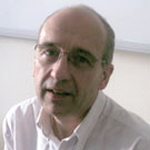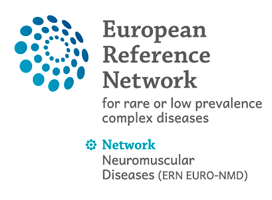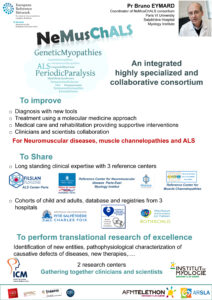30 Nov 2017
Consortium (NeMusChALS), an integrated highly specialized and collaborative structure for clinical expertise, care and translational research for neuromuscular diseases from childhood to adulthood.

Authors:
Bruno Eymard (anne-marie.maronne@aphp.fr), Eymard Bruno Neuromuscular Reference Center ; Benveniste Olivier, Internal Medicine Department; Fontaine Bertrand, Neuromuscular Reference Center; Vicart Savine,Neuromuscular Reference Center; Salachas Francois, Motor Neuron disases Reference center; Bruneteau Gaëlle, Motor Neuron disases Reference center
Our consortium gathers 3 national Reference Centers located in Paris city center (Assistance Publique-Hôpitaux de Paris-APHP): the Reference Center for ALS, for Neuromuscular diseases and Muscle Channelopathies. It offers a highly specialized and collaborative structure for clinical expertise, care and research aspects covering a very large field of genetic and acquired neuromuscular diseases in adults and infants, including channelopathies, autoimmune and metabolic myopathies, and myasthenic syndromes (Myasthenia Gravis, LEMS, congenital myasthenic syndromes), neuropathies (dysimmune and Charcot Marie Tooth), and motoneuron diseases (ALS, Kennedy disease, Primary lateral sclerosis and SMA). Patient foundations have promoted these reference centers: AFM for Myology Institute and channelopathies and ARSLA for ALS. In addition to the long standing clinical expertise of the teams in their respective domains, with large cohorts, we share a wide panel of techniques (detailed histological techniques, biochemical analysis of mitochondrial diseases, molecular genetics, neurophysiology particularly applied to complex excitability and neuromuscular transmission defects, anatomical and functional imaging, high level cardiac assessment). Supportive interventions are provided to ensure the best respiratory, cardiac, feeding support and rehabilitation care. Specific therapies extend from immunomodulation, enzymotherapies to the most recent molecular medicine approaches. All teams are patients centered and numerous international collaborations have been developed. Translational medicine is facilitated by the close collaboration with powerful research institutions located in Pitié-Salpêtrière Hospital: research center of the Myology Institute and the Brain-Spine Institute. This organization model mixing clinicians and scientists, facilitated by registries, has resulted in identification of new entities, pathophysiological characterization of disease-causative defects, development of models for novel therapies and efficient coordination of clinical trials.


